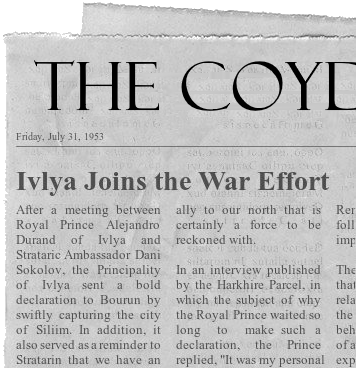Raniid, Bourun, July 24th, 1953
Despite the display of honorless treachery and the attempt at a military response, almost Bouruni soldier had been killed or incapacitated within the hour. Those that didn’t earned scornful looks and had profanities shouted at them from the Stratarians as they were led away, now prisoners of war.
Raniid was Strataric yet again. However, it had come at a price.
Once a city renowned for its architecture, Raniid was now ruined. Hardly a spire stood in testament to its past greatness and power. No longer did children frolic and play in the streets, nor did vendors loudly announce their wares. The guards that had once stood vigilantly by, on the watch for thieves and criminals, no longer graced the presence of the rubble-strewn streets.
Yes, the city had been taken, but at what cost?
[hr]
“The cost was well worth it,” Army General Klyushnikov stated matter-of-factly. “This is war, after all.”
“Well, yes sir,” Polkovnik Laskutin replied, his voice relatively even. “However, Raniid is not very defensible at the moment. It may prove difficult to set up a stable base of operations here…”
“Whatever made you think that we would attempt to ‘set up a stable base of operations’ here, Polkovnik?” Klyushnikov raised an eyebrow at his incompetent subordinate. So hard to find good help these days.
“…sir?”
“We’re going to keep moving, of course. And quickly. Really drive the point home. Retake Alik, then capture Dhard… Dadr…”
“Sir, are you thinking of Dhari-?”
“Shut up.” A moment passed. “Dhariadh. That’s it. Came up with it on my own. Anyhow, speaking from my clear experience of the city, it’s one of the important Bouruni industrial centers, as well as being incredibly massive. You could lose an army in there.” He paused. “Not that I intend to, of course.”
“Of course.”
“But anyway, my point is that we’re going to drive in fast and bloody. Wage war as fast as lightning.”
“You mean,” Laskutin coughed, “like a sort of lightning war, sir?”
Klyushnikov blinked. “That is undeniably the stupidest phrase you’ve uttered today, Polkovnik.” He sighed heavily. “Dismissed.”
Laskutin nodded, turned on his heel, and left quickly. Behind him, he could hear the Army General mutter, “Lightning war. Ha! Stupid name for it.”
